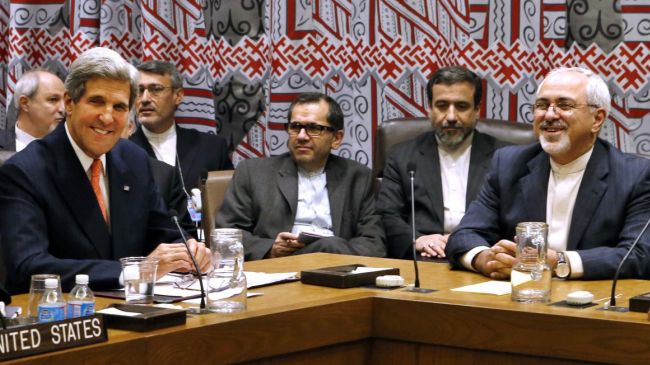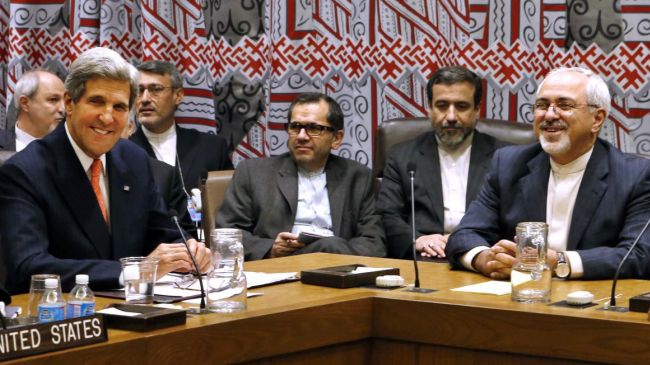 Press TV has conducted an interview with University of Tehran Professor Mohammad Marandi to talk about Western sanctions on Iran over its nuclear energy program.
Press TV has conducted an interview with University of Tehran Professor Mohammad Marandi to talk about Western sanctions on Iran over its nuclear energy program.Below is a rough transcription of that interview:
Press TV:�Iran we are hearing, is seeing less economic benefits than it was promised from that interim nuclear court and they are saying in part, because foreign companies and banks are not willing to risk reengaging the Islamic Republic on a short term basis. So, do you interpret this as a deliberate violation of the deal? In other words, as we said at the beginning of the program, the sanctions regime has been devised in a complicated way and the relief promised cannot be realized?
Marandi:�Yes, there is no doubt that the United States is dragging its feet and it is attempting to put as much pressure on Iran as possible, something that American officials have said on numerous occasions.
So it should be no surprise to anyone if this is stated by analysts or by experts or by anyone outside of the government. These government officials have stated this. I think we also have to look at this from a different perspective.
And that is that the United States has already weakened the sanctions regime in the long-term because it is simultaneously threatening countries like Russia over Ukraine with sanctions, it is threatening China over the South China Sea, and this has drawn China and Russia closer to Iran because now they feel that the United States is beginning to see sanctions as being a tool to use against adversaries and therefore there is already talk of finding ways to restructure global commerce and how the global trade functions.
This is course is not something that is going to happen overnight, but at the end of the day the United States cannot continue to use sanctions directed at ordinary people as a weapon with impunity and to see them continue to be as effective as before.
In the long term, this is going to be a tool that becomes weaker and weaker. For example, when the United States carried out cyber attacks against Iran which is an act of war, initially they had some success, but then the Iranians began to develop their own defenses and now the United States in incapable of carrying out this sort of attack that they carried out before with ease. So, it�s not as if the US doesn�t pay a price for its actions.
Press TV:�Mr. Marandi, do you think, as Mr.[Lawrence] Korb has said, do you see this as a sign the United States has come with good will to resolve the issue. We know that [top Iranian nuclear negotiator] Mr. [Abbas] Araqchi, that he said first of all is going to be limited to Iran�s nuclear issue and he said that because Washington is the main side posing unilateral sanctions, that�s why we are talking with Washington. So do you think this is going to bring about a breakthrough in terms of sanctions relief?
Marandi:�I don�t think we can pass any form of judgment at this stage. The United States so far has not shown good will. The Iranians have abided by the agreement. The Iranians have even got a bit further than the agreement, according to the International Atomic Energy Agency. And the United States on the other hand, has not done so. It has broken both the spirit of the agreement. It has not acted in accordance with the agreement to the letter and therefore we cannot say that the two sides are behaving similarly.
In fact, in the past the United States has imposed sanctions on ordinary Iranians and the intention was to make Iranians suffer. If you look at WikiLeaks documents, the objective for many years ago was to hurt and make ordinary Iranians suffer, to make them put pressure on the government to change its policies.
But there is an opportunity right now and the ball is clearly in the court of the United States. The Iranians are willing to be flexible. They are willing to be as open as necessary to ease any kind of concern that the United States may have, if these concerns are real.
But the United States has to come to terms with the reality in Iran, and that is as President Hassan Rouhani has said Iran will not accept nuclear apartheid. He was very specific about that and that basically means that the United States has to accept Iran�s rights within the framework of the NPT and the Iranians will accept nothing less than that.
At the end of the day, that is the bottom line. So the Iranians can be flexible, but they are not going to relinquish their sovereignty. If the Americans are mature enough to accept this sovereignty, then a deal is possible. If the Americans think that they can bully Iran into forfeiting their rights as a sovereign country, they are deeply mistaken.
Press TV:�Mr. Marandi your view on that?
Marandi:�Obviously that is not true. The US is neither an open society nor are people allowed to express their views without paying a heavy price. In fact, I think your guest in Washington knows two people who come to mind right now who worked in the George W. Bush administration and one of them was thrown out of the New American Foundation, because that person was advocating the normalization of ties with Iran. People pay a very heavy price if they go against the consensus in Washington.
In addition to that, AIPAC has an extraordinary influence in the United States. There is no doubt about that, and when it comes to Iran, AIPAC moves in with full force. Obviously AIPAC is not the only power in Washington, but it is one of the most important powers that exist and it is highly influential and it was highly influential in bringing about the current sanctions.
And by the way, the current sanctions that have been imposed upon Iran are not UN Security Council sanctions. The whole range of UNSC sanctions is less than 10 percent of what we now have. The sanctions that are now imposed, that have caused suffering among women and children and people have died as a result, because of the lack of medicine, are American-imposed sanctions, which are illegal, but they are American-imposed sanctions, they have been passed by Congress, the Senate, and the president has signed on to those sanctions. These are the sanctions that have been directed at ordinary Iranians.
These are the sanctions that AIPAC had backed and had been pushing forward and this is not in the interest of the United States. It is in the interest of Israel. It is in the interest of the United States to move towards rapprochement with Iran.
The US is antagonizing Russia, it is antagonizing China. It has helped create chaos in West Asia and North Africa. Iran is really one of the few parts in this region, one of the few countries in this region that is stable and powerful and the US needs Iran. So it is in the US interest to move towards rapprochement, but it is AIPAC that is very influential in preventing that from happening.
Press TV:�I would like to raise the issue of the ballistic missile program of Iran being raised. Of course Iran said today that nothing other than its nuclear program is going to be discussed. But however, we are hearing that US officials have been trying to justify the inclusion of the ballistic missile issue in these discussions and they say that in the Joint Plan of Action there was reference made to the UNSC resolution which refers to Iran�s ballistic missile program. What is your view on that?
Marandi:�Well, there�s one thing that I�d like to initially point out very quickly and that is that Iran in accordance with the NPT has the right to enrich uranium to 20 percent or 90 percent if it�s for peaceful purposes. So the breakout capacity is really a meaningless statement that American government officials, pundits in the United States repeat. The NPT allows Iran to do whatever it likes to do within the framework of international law for peaceful purposes as long as it�s in accordance with the regulations that are in that treaty.
But with regards to Iran�s defense capabilities I think it�s obvious that the Iranians are not going to put on the table, especially when countries like the United States repeatedly say all options are on the table. It would be utterly foolish for the Iranians to give up their or put down their guard.
The very fact that the United States is keen on for halting its military progress shows that this is exactly one reason why the United States can�t threaten the Iranian people with war, because they know that the Iranians have an effective defense capability and the Americans will be deeply hurt by any form of aggression and in addition, there is no reason why Iran should put anything on the table for the nuclear issue, because if the United States is sincere with regards to solving the problem of the nuclear program, then they can sit down and talk and resolve it.
Once that is resolved, they can talk about a host of issues, but when the Americans want to talk about all sorts of different things in the negotiations, that means the Americans simply want to have more pieces on the table, so that they can get more concessions from Iran.
Press TV:�Mr. Marandi, just quickly before we run out of time. Your concluding remarks on what Mr. Korb said and also if you think these negotiations are moving forward in a positive direction.
Marandi:�We hope that they move forward in a positive direction that�s really up to the United States if they behave reasonably and rationally, then that is possible. But according to the NPT, the Americans cannot put limits on the amount of centrifuges that the Iranians have. The Iranians need tens of thousands of centrifuges just to feed a single nuclear reactor. So it is really impossible to envisage President Rouhani who has said we will not accept nuclear apartheid, to accept such demands from the United States.
The Americans have to really stop talking to themselves� I think they are really misinterpreting President Rouhani�s statements. The feeling in Washington is that somehow President Rouhani is going to say one thing to the Iranian people but he is going to do something else when he talks to the Americans. And I think that that is a major miscalculation on behalf of the United States and potentially a dangerous one. The United States knows that it is in its own interest to change its attitude towards Iran and if it does so, the Iranians will reciprocate.
By Press TV
The Iran Project is not responsible for the content of quoted articles.











